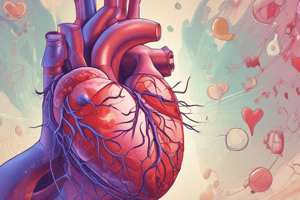Podcast
Questions and Answers
What condition is characterized by impaired left ventricular function resulting in a backlog of blood?
What condition is characterized by impaired left ventricular function resulting in a backlog of blood?
- Acute heart attack
- Hypertension
- Chronic heart failure (correct)
- Aortic stenosis
What defines heart failure with reduced ejection fraction?
What defines heart failure with reduced ejection fraction?
- Ejection fraction exactly 50%
- Ejection fraction greater than 70%
- Ejection fraction less than 50% (correct)
- Ejection fraction above 60%
Which of the following symptoms is associated with paroxysmal nocturnal dyspnoea?
Which of the following symptoms is associated with paroxysmal nocturnal dyspnoea?
- Persistent cough throughout the day
- Chronic fatigue during the day
- Waking up with chest pain
- Sudden shortness of breath at night (correct)
What happens to the left atrium, pulmonary veins, and lungs due to impaired left ventricular function in chronic heart failure?
What happens to the left atrium, pulmonary veins, and lungs due to impaired left ventricular function in chronic heart failure?
Which mechanism may explain paroxysmal nocturnal dyspnoea?
Which mechanism may explain paroxysmal nocturnal dyspnoea?
What physiological change occurs during sleep that affects the respiratory system?
What physiological change occurs during sleep that affects the respiratory system?
Which of the following medications is part of the first-line medical treatment for chronic heart failure?
Which of the following medications is part of the first-line medical treatment for chronic heart failure?
What is the purpose of cardiac resynchronisation therapy (CRT) in heart failure management?
What is the purpose of cardiac resynchronisation therapy (CRT) in heart failure management?
Which heart failure classification system is used to grade the severity of symptoms?
Which heart failure classification system is used to grade the severity of symptoms?
What condition should be closely monitored in patients taking ACE inhibitors and aldosterone antagonists?
What condition should be closely monitored in patients taking ACE inhibitors and aldosterone antagonists?
Flashcards are hidden until you start studying
Study Notes
Chronic Heart Failure Overview
- Chronic heart failure affects the left ventricle's ability to pump blood, leading to impaired circulation.
- Causes a backlog of blood which increases volume and pressure in the left atrium, pulmonary veins, and lungs.
Symptoms and Clinical Features
- Pulmonary oedema occurs due to fluid leakage from the lungs, caused by elevated pressure.
- Ejection fraction is a critical measure of heart function, with normal levels above 50%.
- Two heart failure types:
- Reduced ejection fraction: less than 50%.
- Preserved ejection fraction: greater than 50%, often due to diastolic dysfunction.
Key Symptoms of Chronic Heart Failure
- Paroxysmal nocturnal dyspnoea (PND): patients wake suddenly at night feeling breathless, experiencing cough and wheeze.
- Potential mechanisms for PND include:
- Fluid accumulation in the lungs while lying flat.
- Decreased responsiveness of the brain's respiratory center during sleep.
- Lower adrenaline levels during sleep, reducing cardiac output.
Diagnosis and Assessment
- Diagnosis involves clinical evaluation and various investigations.
- New York Heart Association (NYHA) classification system is used to assess severity based on symptoms.
Management Principles
- Management follows NICE guidelines, using the “RAMPS” mnemonic for five key principles.
- Referral urgency is based on NT-proBNP levels, indicating heart failure severity.
Medical Treatment
- First-line options summarized by the “ABAL” mnemonic:
- Angiotensin receptor blockers (e.g., candesartan) as alternatives to ACE inhibitors if poorly tolerated.
- Aldosterone antagonists for patients with reduced ejection fraction when symptoms persist despite other treatments.
- Monitoring of renal function and electrolytes (U&Es) is critical due to risks of hyperkalaemia, particularly with diuretics and ACE inhibitors.
Additional Management Strategies
- Surgical interventions may address underlying valvular heart disease.
- Implantable cardioverter defibrillators provide shock therapy for life-threatening arrhythmias in high-risk patients.
- Cardiac resynchronisation therapy (CRT) optimizes heart function in severe heart failure (ejection fraction < 35%) through biventricular pacing.
- Heart transplantation may be an option for appropriate candidates with severe disease.
Studying That Suits You
Use AI to generate personalized quizzes and flashcards to suit your learning preferences.




